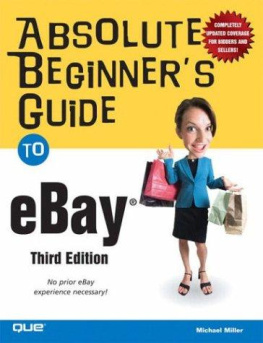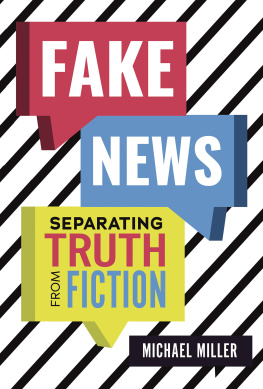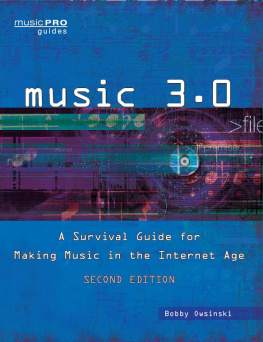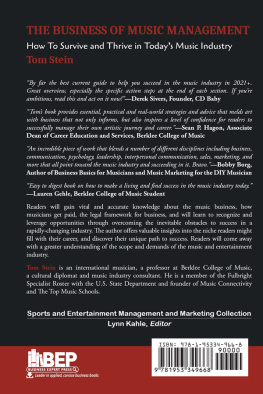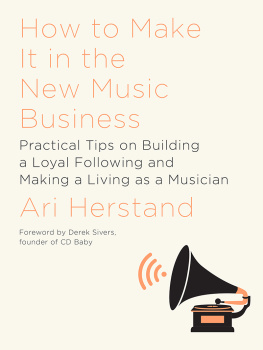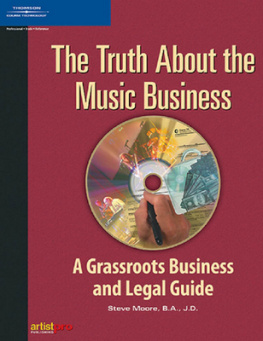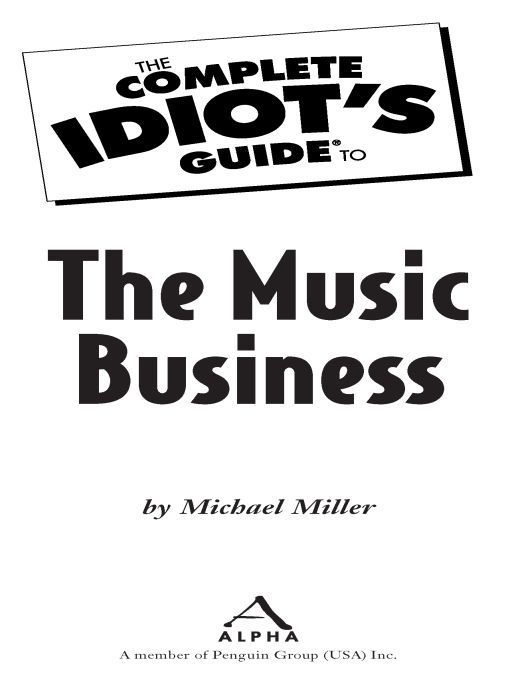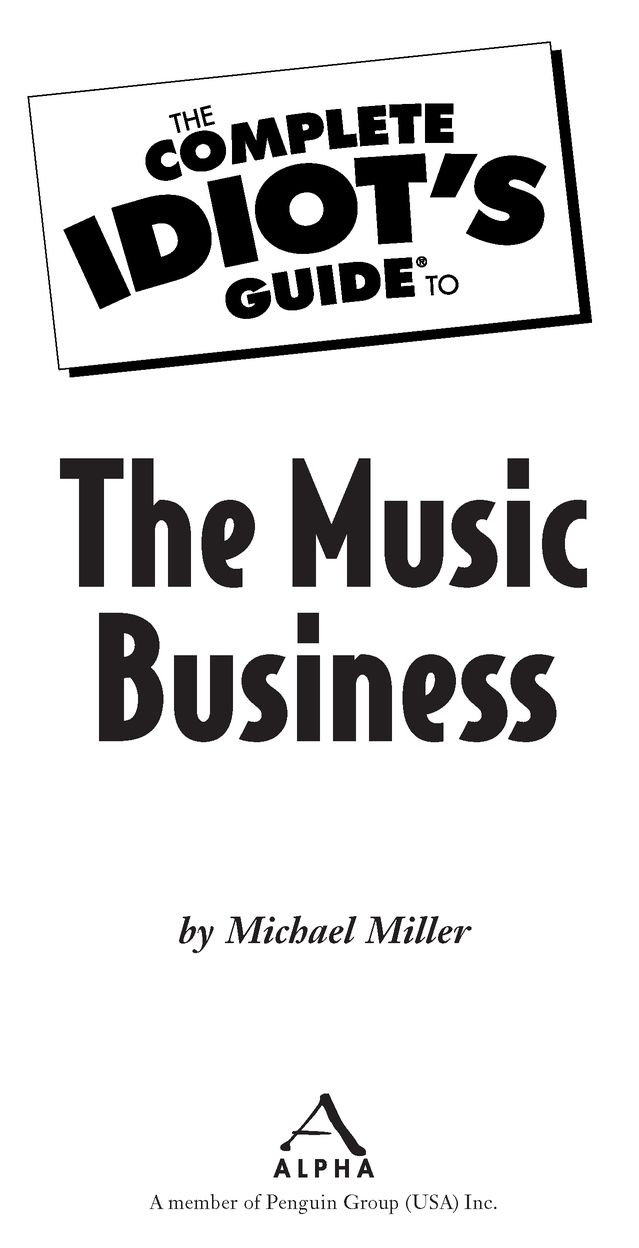Table of Contents
To Sherry: Its nice to have someone to share the music with.
ALPHA BOOKS
Published by the Penguin Group
Penguin Group (USA) Inc., 375 Hudson Street, New York, New York 10014, USA
Penguin Group (Canada), 90 Eglinton Avenue East, Suite 700, Toronto, Ontario M4P 2Y3, Canada (a division of Pearson Penguin Canada Inc.)
Penguin Books Ltd., 80 Strand, London WC2R 0RL, England
Penguin Ireland, 25 St. Stephens Green, Dublin 2, Ireland (a division of Penguin Books Ltd.)
Penguin Group (Australia), 250 Camberwell Road, Camberwell, Victoria 3124, Australia (a division of Pearson Australia Group Pty. Ltd.)
Penguin Books India Pvt. Ltd., 11 Community Centre, Panchsheel Park, New Delhi110 017, India
Penguin Group (NZ), 67 Apollo Drive, Rosedale, North Shore, Auckland 1311, New Zealand (a division of Pearson New Zealand Ltd.)
Penguin Books (South Africa) (Pty.) Ltd., 24 Sturdee Avenue, Rosebank, Johannesburg 2196, South Africa
Penguin Books Ltd., Registered Offices: 80 Strand, London WC2R 0RL, England
Introduction
Its tough trying to make a buck in the music business. Heck, its tough trying to make a buck in any business, but the music business is particularly challenging. Thats at least partially because most musicians would rather be playing than doing business stuff.
Hey, I know how it is. You see a contract or hear somebody talking about points and percentages and you start fantasizing about playing your next big gig. But if you snooze, you loseand in our business, that could mean giving up some big bucks. So it pays to pay attention, and to run your music like a real business.
Now not every musician needs to have Donald Trump-like business skills. If all you do is play an occasional weekend gig for grins and beer money, thats cool. But when you start making real moneyand relying on that money to help pay the rentthen you need to start taking your music seriously. At that point its not a hobby anymore, its a professionand you should treat it as such.
In the old days (say, sometime before yesterday afternoon), the music business was dominated by big record labels and driven by radio play. Thats not the case anymore, and thats a good thing. A hard-working musician today can do just about everything the record labels used torecord, distribute, and promote your own music, from the comfort of your own home. Digital technology makes it relatively easy to cut your own tracks, while the Internet lets you sell your tracks as digital downloads. Just as important, the Internet lets you create your own web page and connect directly with your fans. Its a much different world than it used to be.
The challenge is, how do you take advantage of todays technology and social networking to jumpstart your music career? Do you still need to hire a manager and agent, and sign with a big record labelor can you do some or all of these things yourself?
The Complete Idiots Guide to the Music Business answers these questionsand more. Whether youre playing local lounges or touring big concert halls, whether youre recording your first CD or negotiating a new record deal, whether youre a burgeoning songwriter or in a popular cover band, this book helps you plan your music career and shows you how to do what you need to do to be successful. It doesnt matter whether you play rock, country, jazz, or hip hop, Ill show you how to assemble your team, negotiate better deals, put together an online presence, and make more money from the music you createas well as protect yourself against the scam artists who are only out to get your money.
Who This Book Is For
The Complete Idiots Guide to the Music Business is written for musicians of all types and at all levels. If youre just starting out, youll learn how to create a roadmap to success and assemble the team to take you there. If youre a more experienced musician youll learn new ways to promote your business and get a bigger cut of the profits. And all musicians will benefit from the expert advice for taking advantage of new technologies and opportunities.
By the way, I dont assume that you have a lot of business experience. Just the opposite; I figure you spend more time practicing your instrument than you do balancing your checkbook. Even though theres a lot of business stuff in this book, I try to explain things in terms that even a drummer can understand. (I can say that; Im a drummer, in addition to being a writer.)
Theres even information in this book for nonmusiciansspecifically, for music lovers who want to be part of the music business. So if youre an aspiring manager or agent or A&R person, theres something here for you, too.
One thing, though. For reasons that will become apparent, this book is very U.S.centric. While music is global, business practices are quite local, and I cant present every legal nuance for every country on this big blue ball of ours. So I cover U.S. contract and copyright law, and focus on American companies and organizations. The basic principles apply in other countries, of course, but the legal and corporate details will differ. If youre reading this in another country, sorry about that.
What Youll Find in This Book
The Complete Idiots Guide to the Music Business is your step-by-step guide to making your way in todays music businessturning your music into a paying profession. While it doesnt have to be read from front to back, it helps if you pick up the initial concepts first before you proceed to the more advanced stuff.
To that end, Ive organized the book into five major parts.
Part 1, Welcome to the Music Business, is a gentle introduction to how the music business works. Youll learn why you need to treat your music like a business, what business skills you need, and where exactly the business might be headed in the future.
Part 2, Becoming a Business-Oriented Musician, covers a lot of the big-picture stuff you need to know. Youll learn how to put together a business plan for your music, what kind of business team you need to assemble, how to work with a personal manager, and why you need a business manager to handle your financial affairs.
Part 3, The Music Business for Musicians, is the nuts-and-bolts part of the book, aimed squarely at todays professional musicians. Youll learn all about recording your music, dealing with major record labels, distributing your own music, promoting your music, making money from performing and touring, selling all sorts of merchandise, songwriting and publishing, and licensing your songs for movies, TV shows, and other media. In addition, youll learn all about distributing and promoting your music onlinefrom creating your own website to having iTunes offer your songs for download.
Part 4, The Music Business for Nonmusicians, explores all sorts of jobs in the music business for people who dont play or sing. Music lovers will find advice on careers in artist management, booking, recording and production, and music publishingas well as all the various jobs found at major record labels.
Part 5, The Legal Side of the Music Business, is all about contracts and copyrights. Youll learn how contracts work and how to put together and negotiate your own contracts. Youll also learn about the various types of copyrights, licenses, and royaltiesincluding mechanical, synch, and performance royalties.


